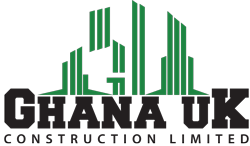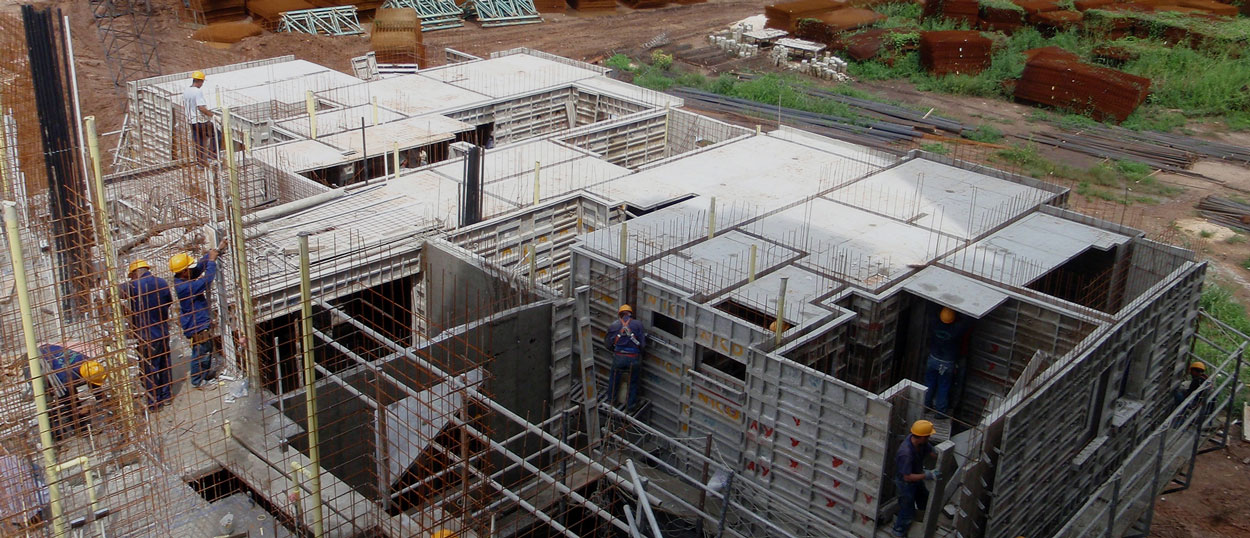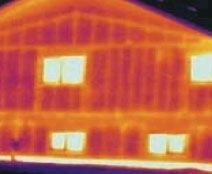WHAT ARE INSULATED CONCRETE FORMS (ICF)?
Insulated Concrete Forms are a light-weight, rigid foam insulating block concrete forming system for both above and below grade steel reinforced concrete wall construction. ICFs are stacked and locked together (similar to “Lego” set) to quickly build interior and/or exterior walls of various heights and thicknesses depending on the engineering requirements. ICF walls can take many different shapes depending on the architectural requirements.
Insulated Concrete Forms (ICF) provides design professionals, architects, home owners and contractors the freedom and versatility to design and build a structure the way it was envisioned. Building with ICF gives the opportunity to build faster and more efficient, while building an eco-friendly structure with substantial benefits that contribute to long-term energy savings.
“An ICF wall system is energy-efficient, structurally tough, comfortable, sound resistant, green and most importantly, can be constructed quickly and cost-effectively.”
Benefits of ICF
Thermal Benefits
ICFs improve the thermal performance of the walls is one of the most immediate and cost-effective ways to reduce running energy costs. ICFs thermal resistance rating (RSI) ranging between 2.6 RSI to 4 RSI (R-15 to R-25). The bigger the number the better the material is able to resist heat transference. On average, ICF structures require 32% less energy to cool and 44% less energy to heat.
Reduced Air Filtration
ICF wall assembly delivers 60% less air filtration than a traditionally built wall. This means that energy efficiency is significantly better, leading to savings in cooling and heating costs, as well as improved indoor air quality.
Energy Efficiency
The combination of the Insulated Concrete Forms and the concrete core acts as a mass wall and blocks air infiltration, allowing buildings to save significantly on their cooling and heating costs.
Structural Performance
Structures that are built with ICF are up to 25%stronger than other concrete walls due to the slow curing of the concrete within the insulated panels which creates walls up to 4 times stronger than wood.
The high structural performance of ICF helps buildings withstand earthquakes, hurricanes and tornadoes, making them an ideal wall system for high-risk geographies.
ICF can withstand winds of up to 402 kph (250 mph). Building with ICF will allow a building to be robust and stand against tough weather conditions. Ideal for any purpose built building but particularly for government and institutional buildings as this will display to the public the conscious effort to make these buildings safe and strong enough to withstand most unfavourable weather conditions.

Sound Resistance
ICF act as an effective sound barrier by dampening sound vibrations from unwanted outside noise, ideal for both residential and commercial construction, providing STC (Sound Transmission Class) rating as high as STC 50 and as high as STC 56 for a 16cm (6.25”) ICF wall.
Insulated Concrete Form technology is straightforward assembly, is easy to learn and even easier to put into practice.
It will take less time to train a worker on how to use and construct ICF wall systems then to train a worker to be a qualified block mason.
Another advantage is there is less need for heavy equipment; therefore, less need for workers with heavy equipment training.
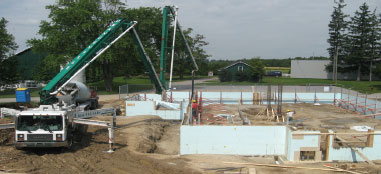
Speed of Construction
For conventional wood, steel stud, concrete block or monolithic concrete construction to show performance equal to ICF, additional materials, labour and equipment would be needed. With Insulated Concrete Forms, one does not need additional air barriers, vapor barriers which would add more labour and materials.
An ICF structure typically costs less than other wall assemblies that have comparable energy efficiency and structural, fire and noise performance. Also, ICF Structures take half the time to construct and therefore, helps accelerate the project’s schedule.
ICF is cost effective. Builders who use Insulated Concrete Forms report savings in the shell construction costs. This is attributable to many factors such as speed and ease of wall erection, reduced waste, ease and speed of mounting windows and doors, etc.
The larger the structure, the greater the savings could be. Savings are generally in the range of 10% and as high as 20% in multi-storey buildings. The reduction of waste alone will produce savings.
Water Resistant
ICF products do not absorb water and are thus waterproof. Exposure to water does not cause swelling. Water vapor will pass through the product but water will not.
Thermal Mass
Studies confirm that concrete mass in exterior walls reduces annual energy costs in buildings, it keeps the walls warmer when the outdoor temperature hits the coldest extreme and keeps the houses cooler when the outdoor temperature is the hottest.
The following shows the thermal mass of an ICF structure and a regular wood framed structure. As one can see, ICF structures have a high thermal mass and retains its cooling or heating to a better extent than other building materials.
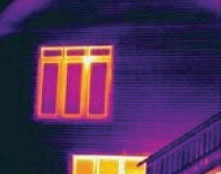
ICF Structure
Non-ICF Structure
The ICF wall minimizes interior temperature swings and reduces the amount of heating or cooling needed.
Durability
The strength of Insulated Concrete Forms comes from the solid concrete core.
Fire Resistance
Of all construction materials, concrete is one of the most resistant to heat and fire. Experience shows that concrete structures are more likely to remain standing through fire than structures made of other materials. Concrete, does not burn.
Unlike steel, it does not break down until it is exposed to thousand of degrees Celsius – far from what is present in a typical house fire. The foam in ICF are manufactured with flame-retardant additives. Insulated Concrete Forms has a fire protection rating of up to 4 hours.
Resistant
An Insulated Concrete Form structure is built to last and retains its value longer. The main structural element in an ICF building is reinforced concrete, which offers substantially better durability and requires less maintenance and repairs over its lifetime.
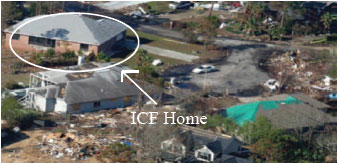
ICF is:
•Termite Resistant
•Mold Resistant
•Crack Resistant
•Pest Resistant
•Waterproof
•No Nail Pops
•Insulation
•Superior Sound
Skilled Workers
Insulated Concrete Form technology is straightforward assembly, is easy to learn and even easier to put into practice.
It will take less time to train a worker on how to use and construct ICF wall systems then to train a worker to be a qualified block mason.
Another advantage is there is less need for heavy equipment; therefore, less need for workers with heavy equipment training.
Resistance to Pests and Rot
EPS provides no nutrient value to plants, animals and microorganisms. Therefore, bacteria and fungi do not multiply. The EPS used by Pro Form System will not rot and is highly resistant to mildew.ICF is of no nutritional value to microorganisms, insects, rodents and plants. No bacteria or fungi therefore do not develop in ICF structures.
Cost Effectiveness

ICF is cost effective. Builders who use Insulated Concrete Forms report savings in the shell construction costs. This is attributable to many factors such as speed and ease of wall erection, reduced waste, ease and speed of mounting windows and doors, etc. The larger the structure, the greater the savings could be. Savings are generally in the range of 10% and as high as 20% in multi-storey buildings. The reduction of waste alone will produce savings.
Different Structures
Single-family Homes

• Same tradesmen can install basement and above ground walls.
• Stronger, more durable construction with fewer deficiencies.
• Ready to meet & exceed new and upcoming building codes
• Lower cooling, heating and operating costs
• Various shapes
Commercial/Institutional

• Significantly lower heating, cooling & operating costs
• Ready to meet & exceed new and upcoming building codes
• Construction is uninterrupted by weather conditions
• Reduced number of trades/people required
High-rise Residencies

• ICF buildings often come in at a lower cost per square foot than masonry and pour-in place construction
• Construction is uninterrupted by weather
• Reduced number of tradespeople required
• Significantly lower cooling
Multi-family Residencies

• Cost-effective fire & sound separation walls
• Same tradesmen can install basement and above ground walls
• Stronger, more durable construction with fewer deficiencies
• Occupants and owners will enjoy significantly lower cooling, heating, & operating costs
We are ISO certified

